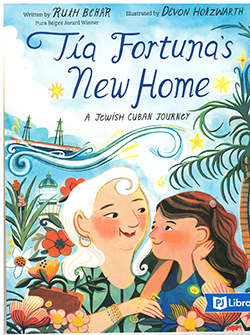Tia Fortuna’s New Home: A Jewish Cuban Journey by Ruth Behar, illustrations by Devon Holzwarth; New York: Alfred A. Knopf © 2022; 9780593-172414, 22 pages including author’s note and glossary, $14.52 on Amazon.

 SAN DIEGO – This PJ Library selection to be read with 6-year-old children and up models a positive outlook on life, even when confronted with change. Estrella visits her aunt (tia) Fortuna at the little house (casita) on the beach where she has lived ever since she left Cuba as a refugee. But now, the casita is to be torn down to make way for a luxury hotel.
SAN DIEGO – This PJ Library selection to be read with 6-year-old children and up models a positive outlook on life, even when confronted with change. Estrella visits her aunt (tia) Fortuna at the little house (casita) on the beach where she has lived ever since she left Cuba as a refugee. But now, the casita is to be torn down to make way for a luxury hotel.
Estrella helps Tia Fortuna pack her things and then goes with her to the beach, where her aunt takes joy in the sea, the salty air, and the sand. Then they return to the casita to have traditional borekas (meat or potato pies) made from a recipe that her family had passed down for more than 500 years from Spain to Turkey to Cuba to Florida. “We come from people who found hope wherever they went,” Fortuna tells her niece.
Eventually, it is time to go. Fortuna takes the mezuzah down from her doorpost, locks the door, deposits the key in her pocket, whispers goodbye to her palm trees, and they are driven by Estrella’s mother to La Casa de los Viejitos (Home of the old people). Fortuna finds a banyan tree and introduces herself to it, then comes into the seniors’ home and shares borekas that she baked for the multinational residents, who take a liking to her instantly. One lady hears Estrella and Fortuna speaking in Spanish and confides she used to wave at the ships from the shore of Havana. “So did I,” responded Fortuna. “I am glad that we will be neighbors.”
The mezuzah is placed on the doorpost of Fortuna’s seaside room. She and Estrella make plans to sit in the garden on Estrella’s next visit and watch butterflies dance. Fortuna gives Estrella the key to the casita to wear as a pendant – just as she had worn a key from her former home in Cuba, and her ancestors had kept the keys of their homes in Turkey and Spain.
When Fortuna looks at her key, she explains to her niece, “I can see the grandmothers and grandfathers from long ago, carrying borekas from Spain to Turkey to Miami.”
There are many small lessons in this wonderful book. It acquaints young readers with a few Sephardic traditions, customs, and expressions such as “Mazal bueno” (Good Luck!). When Tia meets her new neighbors, they are a multicultural and multiracial group, thanking her for the borekas in English, Japanese, Yiddish, Spanish, French, and Hebrew – illustrating that friends don’t have to look or sound like you. Tia Fortuna has a great love for nature and the outdoors. She appreciates trees, butterflies, the breezes, the sea, the beach. And, her Jewish faith, symbolized by the mezuzah, is strong.
*
Donald H. Harrison is editor emeritus of San Diego Jewish World. He may be contacted via donald.harrison@sdjewishworld.com